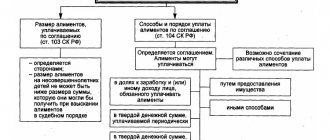Alimony from mother
The legal representatives can demand payment of alimony from the mother : the father raising the child , guardian or trustee.
You can request alimony payments both during marriage and after divorce. In order to receive alimony, it is important for the child’s father to know that the mother must have the financial means to fulfill the monetary obligation or property that can be foreclosed on. Paternity must be officially . The child’s age is no more than eighteen years, or the child must be disabled.
Alimony can be collected in a fixed amount of money, or in the amount of one-fourth of the mother’s income for one child, for two children the amount is one-third of her earnings, for three or more children - half of the mother’s income.
Collection of alimony from the mother is possible by concluding an agreement on the payment of alimony between the parents, or on the basis of a court order or filing a statement of claim to obtain a court decision to collect alimony.
Is it possible to recover child support from the mother of a child?
Alimony provision does not depend on the gender of the alimony payer, since according to the RF IC, each parent has the same set of rights and obligations to minors.
This leads to the fact that if such persons live with their father, then child support can be provided by their mother. Important! To carry out the process of collecting funds from the mother, it is necessary to take into account that all documents will be required, as well as compliance with the established conditions. This point is important, since the legislation has many nuances related to this procedure.
Additionally, it is necessary that the collection process is carried out by the person who has the right to do so. The circle of such citizens is limited.
Conditions under which you can count on alimony from the child’s mother
According to Family Law, parents are required to support their minor children . If the mother evades fulfilling her duties, then the father caring for the common child has every right to demand that she pay child support. This can be done both while married and after its dissolution.
A father who insists on payments in favor of his children must remember that the following conditions exist that make such a requirement possible:
- The relationship of the father and mother with the children must be documented . If, as a rule, everything is simple with the mother, because she is the one indicated on the child’s birth certificate, then difficulties may arise with the status of the father. To claim payment of alimony, the father must be recorded in this capacity on the birth certificate or must acknowledge paternity if the child was born out of wedlock or his mother initially decided to put a dash in the “father” column. Thus, in order to claim child support from the mother, the applicant's paternity must be legally recognized.
- It is important to know that even if the father of the children is not legally the spouse of an unscrupulous mother who evades providing support to the children, he has every right to demand alimony from her .
- The child for whose upbringing the father expects to receive payments must be no older than 18 years , since upon reaching the age of majority, the mother’s statutory obligation to pay child support ceases automatically. Exceptions are situations when disabled adult children need help.
- You can also collect alimony from the mother of a common child for the past period, but only within a period of 3 years - see paragraph. 2 hours 2 tbsp. 107 of the Family Code (SC) of the Russian Federation. This means that if the father did not demand alimony for many years, and then suddenly decided to do so, collection of alimony is possible only for a three-year period and only if the man proves that he had previously turned to the child’s mother for help, but was refused .
Conditions for assigning alimony to the mother of a child under 3 years of age
Very often you can hear the question of whether it is necessary to pay child support to the mother of a child under 3 years old. The Family Code of the Russian Federation states in Article 89 that parents are obliged to financially support each other. If one of the parents refuses to help a person in need, the other has the right to file a claim in court. To do this, the following conditions must be met:
- a pregnant woman needs help;
- the parent who needs help is disabled;
- the spouse takes care of a child of group 1 disability for life, or a disabled person of group 2-3 until he reaches adulthood.
It is worth considering that the mother of a child under three years old can receive alimony for her own maintenance if she has a difficult financial situation. However, such an obligation does not arise automatically for the father. The presence of problems with the mother’s financial situation must be proven in court. This condition is stated in Article 90 of the Family Code of the Russian Federation.
Where to contact?
If the issue of alimony payments was resolved through a compromise, then the relevant paper simply needs to be certified by a notary and signed (signatures of both parents/guardians are required).
If a child lives with the father and the mother refuses to fulfill her obligations, then the parent has the right to collect child support through the court. The statement of claim is submitted to the magistrate’s court at the defendant’s address (you can also contact the district court, but there are strict requirements for applicants).
Appeal to the magistrate's court has one advantage and one disadvantage. First, the court takes the plaintiff’s side, even without a trial (this happens during an appeal, in the district court). Secondly, when calculating the amount of child support payments, the defendant’s salary is taken into account, which is indicated in Article 82 of the Family Code of the Russian Federation . It is impossible to obtain alimony from alternative sources of income.
What documents are needed?
To obtain alimony from an unscrupulous mother, the father must submit to the magistrate’s court not only a petition, but also certain documentation confirming his right to alimony payments.
List of documents for a claim for the recovery of child support:
- the applicant's identity card;
- child's birth certificate;
- marriage/divorce certificate of spouses;
- confirmation of the official employment of the defendant.
The application is drawn up independently, using a sample , or by contacting specialists who will resolve this issue for a fee.
To whom and in what amount are payments made?
If the question arises whether it is worth applying for alimony after a divorce or a spouse leaves the family, the answer is clear - this should definitely be done. In accordance with Article 106, biological or adoptive parents and guardians of minor children can collect alimony through the court. This right is a legal right.
However, if the interests of a young child are infringed, then a representative of the guardianship authority can go to court without the knowledge of the parents. Also, a representative of this service has the right to collect alimony from the father and mother.
One of the parents may not apply for child support if he is able to provide for the child on his own. To prove your financial capabilities, you must show representatives of the guardianship authorities a certificate confirming your income, a receipt for receiving financial assistance, or checks for money transfers via mail or bank.
It is not necessary to go to court; the parties can agree on the amount and timing of payments, and the voluntary agreement must be certified by a notary. This method is considered the simplest; there is no need to collect documents, file a claim, attend court hearings, etc. But if a voluntary agreement cannot be drawn up, one of the parties has the right to collect alimony through the court.
In accordance with the Family Code, the following categories of citizens have the right to alimony:

Parents to support a minor child.- Parents are pensioners or disabled people who need financial assistance.
These are the main types of alimony payments.
Not everyone knows that you can demand money for the maintenance of children from both the husband and the wife. It all depends on who is raising the child from a common marriage. You can demand alimony in a divorce or in a marriage if the father or mother does not fulfill their parental responsibilities.
If, as a result of a voluntary agreement, one of the parties does not pay money within 3 years, then alimony can be recovered through the court retroactively.
In accordance with the Family Code, alimony must be demanded from the following categories of citizens:
- From a husband or wife for the maintenance of an incapacitated son or daughter who has reached the age of 18.

From the wife or husband, if one of them became unable to work before the divorce or within a year after it.- From the husband in favor of the wife who is pregnant and within 3 years of the birth of their common son or daughter.
- From a brother, sister, grandfather, grandmother, grandson, pupil in favor of a disabled close relative.
If the father has refused to pay money for child support for a long time and does not recognize him, it is necessary to establish paternity and collect alimony through the court retroactively.
Who has the right to claim alimony from the mother?
A mother who does not pay child support may be subject to the collection of the necessary funds after the child's legal representative applies to the court. The categories of citizens who have the right to appeal to the courts are established by law. Among them:
- a father who has documents in his hands that confirm his paternity;
- guardian;
- trustee.
In each case, you will need to have the necessary documentation confirming the possibility of carrying out the procedure, that is, certificates are required that indicate the grounds for guardianship or trusteeship.
Important! If the mother does not live with her son or daughter, but is officially married to a man, then it is possible to apply for alimony, as in other cases.
According to the norms of family law, any person can be the payer of documents, but the plaintiff must fully confirm his right to receive funds from this person.
Algorithm for receiving payments
Cases where children voluntarily provide their parents with everything they need or what they can, to the best of their ability, are not considered here. The point is that the father or mother is experiencing a serious lack of funds, and their adult son (or daughter) does not take part and does not provide them with financial assistance.
The following order is recommended:
- Collect the necessary documents that indicate an urgent and objective need for money.
- Conduct a conversation with the child, show him documents and calculations, indicate the missing amount that is missing every month/quarter.
- Offer to draw up a voluntary agreement on payments, which will officially assign another dependent to the payer.
- If you refuse to sign the agreement and pay alimony, file a claim and send it to court.
- Defend your position in court and achieve satisfaction of claims.
- Receive a writ of execution and accompany the work of the bailiffs.
The bilateral agreement provides some preferences. For example, if a child himself is classified as disabled, he is registered in the first group, he has the right to social benefits from 11,211 to 14,415 rubles, depending on the number of dependents.
That is, part of the required amount for the financial support of parents can be compensated through these benefits. If the payer belongs to the second and third disability groups and has dependents, he is also entitled to payments, but of a smaller size - from 4004 to 9610 rubles.
Another option is that having dependents allows you to reduce the amount of alimony. It doesn’t always work; the court carefully considers the size and sources of income of dependent pensioners, but it can be an argument in justifying the parent’s position.
If the issue of alimony cannot be resolved pre-trial, all that remains is to collect documents and file a claim. When going to court, you must submit the following documents :
- Which confirm the family relationship with the defendant: certificate, extract or certificate from the registry office.
- Pension certificate, conclusion of a medical social examination about disability.
- Other official documents that confirm the grounds for alimony: a certificate of the amount of the pension, the level of the cost of living in the region, the prescribed treatment and the cost of medications, procedures, etc.
These documents are the basis for describing the circumstances that forced the parent to go to court with demands for alimony. They (their copies) are attached to the claim in the form of addenda.
We will learn how to draw up a statement of claim for the recovery of alimony for the maintenance of a parent by reading this article.
After winning the court case, you need to obtain a writ of execution and send it to the Federal Bailiff Service. The alternative is to present the decision to the defendant for voluntary compliance or take it to the accounting department at his place of work.
Amount of child support from the child's mother
Child support is funds provided by law for separated minors or disabled children. The amount of these payments can be determined by an agreement reached between the parents or based on a court decision .
The agreement on alimony payments is drawn up in writing and must be certified by a notary (Article 100 of the RF IC).
For a disabled child, alimony is paid every month and in a clearly established amount (Article 85 of the RF IC). A child recognized as disabled for health reasons is a child. A child studying full-time in an educational institution until the age of 23 is not considered disabled.
Funds for the maintenance of a minor child, recovered by court decision, are calculated:
- three children or more - exactly half of the mother’s earnings;
- two children - one third of the income received;
- one child - one fourth of the salary (Article 81 of the RF IC);
- or determined by the court as a specific monetary amount.
It is important that the amount of alimony payments, which is established by agreement of the parties, should not be lower than the amount of alimony that could be determined by the court (Article 103 of the RF IC).
Calculation of alimony amounts without agreement
The size is directly dependent on the number of minors who need support, as well as the financial situation of the payer. It may have a percentage of the alimony payer’s income or be fixed.
Share size in percentage:
- 1 person - 25% of total income;
- 2 persons - a third of income or 33%;
- from 3 persons - 50%.
Division of alimony
A fixed payment in a fixed amount of money is established in case of unstable income or lack of official and permanent income. This option is also used when receiving salaries in foreign currency.
If necessary, the two payment options can be combined. It is also necessary to remember that the amount of payments may be increased or decreased if one of the parties applies to the court with additional information or reasons.
Important! In the absence of official employment, the amount of security must be calculated according to the minimum wage established in the region.
If there is a debt, an inventory and further sale of the property to pay it off are possible. This procedure is carried out by bailiffs.
Income for calculating alimony
To calculate funds payable, all types of income that can be received from any activity, including labor, are used. From wages, money is withheld from almost all funds, including:
- main and additional income, in particular when working part-time;
- income from government, scientific or artistic activities;
- labor bonuses or any allowances;
- sick leave or vacation pay, as well as various compensations for harm or unused vacation.
Additional income is also covered by alimony support. This can be either a pension, with the exception of funds received upon the loss of a breadwinner, or income from real estate or investments.
All business activities are also subject to the necessary payments.
Important! The legislation additionally has a list of incomes from which it is impossible to collect money. These include the amount of income tax, as well as various additional transfers that a person receives. An example would be alimony transfers from a third party. All non-taxable options are specified in Article 101 of Federal Law No. 229-FZ.
It will also be necessary to take into account that the maximum amount of funds from wages in the presence of debts cannot exceed 70% of the total salary and all allowances and bonuses.
Minimum amount of alimony
The minimum amount of alimony support depends on the type of collection.
If a percentage is established, then the minimum amount is equal to the established share. With a fixed payment option, there will be indexation and correlation with the regional minimum wage level. If such an amount is not established in the region, then the calculation is made based on the average amount in the Russian Federation.
An important point is the possibility of reducing payments, but for this you will need to provide the necessary data on this basis. Such conditions may include the birth of children, disability, or a difficult financial situation. All issues regarding setting the minimum amount in this case are considered by applying to the court.
How to collect child support from the mother of a child
To receive child support payments from the mother of the child, the father must take into account the following conditions:
- Paternity must be officially confirmed. That is, the father must be indicated as such on the child’s birth certificate. When the parents are married, this entry is made automatically. If the child was born out of wedlock, then the fact of paternity is determined either judicially or voluntarily.
- The child must not be more than 18 years old , otherwise, upon reaching adulthood, the mother’s obligation to pay child support will be terminated. In addition to payments for disabled adult children.
- The mother must have material means to fulfill obligations, or property to recover. However, lack of income is not a basis for exemption from alimony.
The mother is obliged to seek funds to pay alimony , otherwise, through the bailiff service, the father has the right to foreclose on the property that belongs to her.
It is possible to collect alimony from the mother in the following ways :
- execution of a voluntary agreement , which specifies the method, procedure and amount of payments for alimony obligations. If the mother refuses to fulfill such an agreement, the father has the right to turn to the bailiffs or at the mother’s place of work to enforce the collection of alimony (Article 99 of the RF IC);
- by applying to the magistrate's court to obtain a court order (court decision to collect a sum of money from a person) (Article 121 of the Code of Civil Procedure of the Russian Federation). The order is issued by the court after filing the application within 5 days . In simplified proceedings, that is, when making an order, the presence of the parties is not necessary. The court order is sent to the bailiffs;
- by filing a statement of claim in court (Article 106 of the RF IC).
For a child who is being raised by a guardian or trustee , or is permanently residing in specialized organizations (medical, educational institutions), alimony is collected from the mother through the court (Article 84 of the RF IC).
For the past period, alimony is collected only within three years from the date of application to the court, and it must be established that measures were previously taken to obtain alimony, but the person obligated to pay evaded paying it (Article 107 of the RF IC).
How is alimony arranged?
Alimony in the absence of a legal marriage may be ordered for payment:
- as a result of an agreement between parents on a voluntary basis;
- by collection by court order;
- through the court (by filing a statement of claim).
Each of these methods will be discussed next.
Voluntary agreement
There may be a situation where the parents maintain a good relationship, despite the fact that they no longer live together, and the child’s father is ready to help financially.
In this case, mom and dad can agree and enter into a child support agreement, in which it is very important to stipulate:
- Amount of payments.
- In what order will the amount be calculated? This could be a flat sum of money or a percentage of the father's earnings.
- Frequency of alimony payments.
- In what order will the money be transferred (cash, to a bank account, postal transfer, salary deduction, etc.)
The signed agreement must be notarized by applying to any notary office.
This must be done, since the notary’s certifying signature on the agreement equates this document to a writ of execution, with which you can apply to the bailiffs to collect alimony if the obligated parent suddenly refuses to pay alimony.
Court order
An application for a court order is submitted to the court by the parent who is supporting the minor.
If this is the mother of the child, then she has the right to collect alimony in this way only if:
- the child’s father does not deny his blood relationship with the minor, or his name is already entered on the birth certificate in a special column (there is no need to prove paternity);
- if there is no dispute between the parents about who the child will live with in the future.
If these conditions exist, an application is submitted to the court at the place of registration of the child’s mother, accompanied by documents, which will be discussed in detail below.
Statement of claim
The statement of claim is submitted to the magistrate at the child’s place of residence.
A claim is a document drawn up by the applicant (parent who wants to collect alimony), in which it is necessary to reflect special circumstances that, when the case is considered by the court, will influence the final amount of alimony collected:
- information about the income of the parent who is obliged to pay child support;
- information about the parent who is supporting the child at a given time and lives with him;
- the fact of incapacity for work of the parent filing the claim (if any); information about the child’s lack of his own home;
- mentions of unforeseen events (fire, theft of property, etc.);
- a conclusion confirming that the minor needs additional care for any objective reasons.
In addition to the above, the statement of claim must contain standard form attributes.
- The name of the court and full name are written in the header of the application. the judge to whom it is sent, as well as the full name, address of residence (registration) and information about the contacts of the plaintiff, defendant, representative of the plaintiff (if the plaintiff seeks his help).
- The name of the application is indicated as “a statement of claim for the recovery of alimony for the child (children).”
- At the end of the application, a pleading part is written, which states “I ask you to collect from (full name of the parent from whom alimony is being collected) in favor of the plaintiff for the maintenance of (full name of the child) alimony in the amount of (specify share) from all types of earnings and other income monthly, starting from the date of filing the claim until the child reaches 18 years of age.”
- Date and signature of the plaintiff (or representative by proxy).
All these circumstances must be proven by relevant documents in copies attached to the statement of claim.
When considering a statement of claim in court, the judge may ask the applicant to present the originals of all attached documents for review and certification of the copies on file.
When filing a claim in court, the plaintiff needs to be prepared for the fact that the defendant (for example, the child’s father) will submit a response to the claim, in which he will present his vision of the situation and attach the supporting documents he has.
And only then, based on all the evidence presented by both parties, the judge will decide on the optimal amount of child support so that the defendant can pay it in proportion to his income.
How to file a claim for alimony from your mother?
Fathers who are raising a child alone are interested in the procedure for filing an application for child support for a mother who is shirking her parental responsibilities.
There are two ways to collect payments for a child:
- by drawing up a voluntary alimony agreement between the parents, in which they will determine the amount of payments and the procedure for receiving them;
- by filing a claim in court on the father's part.
The second method is used in cases where the parents were unable to reach an agreement among themselves. The alimony agreement must be certified by a notary, otherwise it will have no legal force.
Decor
There are two ways to apply for child support:
- Voluntary registration . In this case, the parents can enter into an agreement that the mother will pay funds for the maintenance of the child (children) in a certain amount and order. Such an agreement must be certified by a notary, otherwise it is simply invalid.
- Involvement of the judiciary. If agreement cannot be reached, the father must seek help from the court. This is done according to the following algorithm:
- Step 1. The father applies to the court at the place of residence of the mother of the child (children) and, depending on the circumstances, files an application for a court order or a claim for the recovery of alimony for common children.
- Step 2. The issued order or court decision is sent to the bailiff service, which initiates legal proceedings and collects alimony from the mother (at the place of work, through the sale of property belonging to her, etc.)
Statement of claim for the recovery of alimony from the mother of the child
A claim for alimony from the mother must be filed with the magistrate's court at her place of residence or at the place of residence of the father . The state fee for such claims is not paid (Article 333.36 of the Tax Code of the Russian Federation). The court considers the application and makes a decision on its acceptance within five days.
Lack of financial assistance from the mother for the child is the main condition for going to court. At the same time, if the mother provides some kind of financial assistance, then it is necessary to indicate the periods and amount of payments, and explain to the court why these funds are not enough .
The claim itself can be filed in person or, for example, sent by mail ; the courts provide for the possibility of filing such documents in electronic form .
The claim must contain the following information:
- information about the court to which the document is sent: address, court district;
- information about the applicant: last name, first name, patronymic, date of birth, place of birth, residential address, telephone number;
- information about the defendant (the same as information about the applicant);
- information about circumstances relevant to the court, for example, whether the parents were married, whether the mother provided financial assistance to the child;
- links to articles from the codes of the Russian Federation confirming the father’s right to receive alimony and to submit an application to the court;
- amount of alimony.
The application must be accompanied by the child’s birth certificate, a certificate of family composition, marriage registration documents or divorce documents if the parents were married, and other documents that the court may need.
Claims to recover alimony from the mother for a disabled child can be filed by the adult himself or his guardian or trustee . The fact of whether a child needs to receive alimony is determined by the court for each specific case.
What to do if a claim for alimony has already been filed
A peaceful way to resolve the issue of alimony for the maintenance of common minor children or a wife on maternity leave, unfortunately, is a rather rare phenomenon in society. The most common option is to collect and withhold alimony payments through the court. Moreover, the proceedings for their accrual can be:
- orderly;
- claimable.
The first option is the most comfortable for the plaintiff, since it does not require the appearance of either him or the defendant, and the decision is made by the judge based on the study of documents.
Often, a potential alimony payer learns of the fact that in the future he will have to allocate part of his income to support a child shared with his wife, having received a court order, or after funds have already been withheld from wages.

There may be two solutions to the question of what to do if you have filed a lawsuit for alimony - pay money in the amounts determined by the court order, or cancel it and take part in court hearings to collect alimony, which will be carried out in the manner of litigation.
Conduct in court and payment options
If the defendant decides to take part in court hearings to collect alimony from him in favor of common children due to the fact that he objects to the very fact of withholding alimony payments or their amount, he must build a line of defense for his own position and competently, with the provision of evidence, defend it during court hearings, when he is given the opportunity to do so.
If the defendant has changed his attitude to the subject of the dispute and decided to agree with the spouse’s demand for alimony in the form in which they are requested in the statement of claim, he can complete the court hearing with his statement that he supports the claim in full. Otherwise, the hearing will continue.
You can state your position when the court invites the parties to provide explanations on the subject of the dispute and then during the debate and during the exchange of remarks.
By the beginning of the trial, the court must have at its disposal all the evidence, and witnesses must be present at the hearing (if necessary). The court may assign various payment options, which in different situations involve withholding in:
- shares of income;
- a fixed amount with payment at certain time intervals;
- combinations of the above options.
The defendant in the case has the right to prepare objections to the wife’s claim. They may also file a counterclaim in accordance with the rules -. For example, if a spouse files for withholding of alimony in a fixed amount of money, then the defendant can file a request for a complete exemption from payments if there are compelling reasons for this.
Options for action in various situations
Depending on the situation in which the potential alimony payer finds himself, his line of behavior has its own nuances. In some cases, you can try to challenge the court decision to collect alimony or its amount if you are firmly convinced that you are right. This is possible if the defendant, for example, doubts biological paternity or the ex-wife applied for alimony, having her own high income, while the defendant belongs to a low-paid category of citizens or currently has no income at all.
What to do if a common-law wife filed a claim for alimony
According to the legislation of the Russian Federation, children of one parent, born in a legal marriage and born without a marriage union, are endowed with the same rights, including material support until they reach adulthood. A woman who has a child in an unregistered family relationship with a man can file for recovery of alimony from him in favor of the common child. In this case, if the paternity of the possible defendant is not disputed and he is included in the birth certificate with his own written consent, alimony will be collected from the defendant in the same way as for a child whose marriage with his mother is officially registered.

In cases where paternity is disputed and not documented, the common-law wife has no legal grounds to file such a claim. It will become possible only if biological paternity is confirmed by a special procedure for establishing it.
What to do if your mistress applies for alimony
If alimony claims are made against a man by a woman with whom he did not live together and did not have a joint household, her demands for maintenance of a child born as a result of such a relationship will be valid in the same cases as when filing a claim. "common-law wife" Since, according to the law, there is the only legally valid type of family relationship between a man and a woman - this is a marriage union registered with the registry office according to the procedure established by law, after which they become husband and wife.
In all other cases, it does not matter what the woman is called - mistress, common-law wife or cohabitant; alimony for a child born outside of a legal marriage can be recovered by her only after going through the procedure for establishing paternity, if the man has not recognized himself as such and has not secured it legal recognition in the registry office.
What to do if your child lives with his grandmother
A situation where, after the parents’ divorce, a common child lives with his grandmother, and his mother receives alimony for him, who spends the money not on the maintenance of the child, but on her own needs, may be a reason to go to court. The court, at the request of a parent from whom alimony for minor children is being collected, has the right to make a decision to transfer no more than half of the amount of alimony to accounts that are opened in the name of a minor child in a banking institution ().
Collection of alimony from mother
The collection of alimony is carried out by the court. If the child’s parents entered into an agreement on the payment of alimony, but it is not fulfilled by the mother, the father can immediately contact the enforcement service, since a notarized agreement has the status of a writ of execution. In this case, there is no need to contact the judicial authorities. If an agreement has not been concluded, then the procedure for collecting alimony can be determined in court, and this decision will be implemented by bailiffs.
If the mother is working, alimony will be deducted from her salary in the amount specified in the agreement or writ of execution. The accounting department of the enterprise will deal with this issue, transferring the required amount to the father’s account. If the mother does not have income or it is insufficient to pay child support, the enforcement service can withhold it from the funds that are in the mother’s bank accounts. If these funds are insufficient, the property will be foreclosed on.
Methods for collecting alimony amounts
Bailiffs work with any document establishing alimony payments.
The recipient turns to them if the mother avoids spending on the children. Court decisions and orders are sent to the Federal Bailiff Service in any case. Its specialists have three ways of influencing the defaulter:
- The writ of execution is transferred to the organization that accrues income to the defendant. If there are several of them, then copies are given to them. The accounting department makes deductions from the salary in favor of the plaintiff. For this operation, the mother's consent is not required.
- If there is no official employment, then funds in the woman’s bank accounts are used. Alimony amounts are withheld from them. This is what happens when a woman is registered as an individual entrepreneur.
- If there is no income, the mother's property is sold at auction. There is a certain order to this process: Bailiffs describe the property.
- It will be sold at auction.
- Debt on alimony payments is transferred to the account of the father or children.
- The balance is returned to the defaulter.
Important: there is no statute of limitations for alimony payments. However, they collect them only for the last three years preceding the application to the judicial authorities.
Should a father pay child support if the child lives with him?
But alimony is not always collected from former spouses. Married couples also face a problem when the father or mother refuses to contribute funds to the family budget for the maintenance of children. Maintaining relationships is problematic here.
The question arises: is it possible to file for child support for the child’s mother or her father (depending on the situation) if the couple is still married?
There are no legislative restrictions on the plaintiff if the second parent does not fulfill his responsibilities for the financial support of the children. The claim may be filed before the divorce or during the divorce proceedings. That is, the second parent has the right to file a lawsuit against the unscrupulous spouse demanding the collection of alimony even when living together.
But who has the right to file for child support for the mother or father of the child? Typically, a claim for maintenance is filed by the spouse who remains living with the children and is forced to support them on his own, but the plaintiff can also be a guardian. Natural and adoptive parents have the same rights.
When both parents fail to fulfill their legal responsibilities towards the child, a claim is filed against them by the guardianship authorities. If both parents remain with the children, then alimony payments, according to paragraph 3 of Article 83 of the RF IC, are paid to the needier party.
What is the required amount?
Now about payers. First, they must be of age and able to work. This is the main and necessary condition for assigning alimony. It will not be possible to collect child support if the children :
- Have not reached the age of 18 or 23 if they are studying at a university;
- Are disabled people of the first or second group;
- Reached retirement age.
This means that alimony cannot be assigned to a daughter who is 55 years old and is legally entitled to an old-age pension. On the other hand, it is possible to recover financial support from her for the last 3 years, provided that she took on or intended to take on the responsibility for maintaining her father or mother.
Secondly, the amount of alimony is set at a fixed amount and determined by the court. This is the main difference from child support, which can count on a quarter, one-sixth or less of the parent's total income, depending on the number of children he or she has.
When assigning child support, the main factors are the average income level in the region and the total earnings of the payer. To determine the amount of financial support for parents, the size of the payer’s income and the specific need of the parent are important.
That is, if we are talking about the fact that a disabled mother or father does not have enough funds for treatment, the court establishes :
- The amount of missing money;
- Financial capabilities of the child;
- The number of children the plaintiff has;
- Having a spouse, including an ex.
Family law provides for a whole chapter on the alimony obligations of spouses to each other (Chapter 14).
If there are several children, the responsibilities for the financial support of the parents are distributed among all, even if only one child is declared as a defendant. The absence of financial claims against other children on the part of parents does not relieve them of the obligation to pay child support if the father and mother need it.
The financial capabilities of the payer are also :
- The amount of total income;
- Number of dependents;
- Availability of other obligations – credit, mortgage, loan.
The plaintiff's sources of income are also taken into account. This could be savings, valuable property, a personal plot, renting out an apartment, room, garage or house. All of the factors described are taken into account when considering the case and determining what amount the plaintiff is entitled to.
Court decision to collect alimony from mother
A civil case to collect alimony from the mother ends with a court decision By its decision, the court may:
- satisfy demands for payment of alimony;
- refuse to satisfy such demands.
If the collection of alimony from the mother is refused, the father or legal representative has the right to file an appeal (a means of appealing a court decision). An appeal is filed through the court that made the corresponding decision, no later than one month (Article 321 of the Code of Civil Procedure of the Russian Federation)
The court decision itself to collect alimony from the mother comes into force one month after it is made. a writ of execution from the magistrate to force the collection of alimony from the child’s mother through the bailiff service.
It is important that the alimony received by the father, guardian or trustee must be spent exclusively on the needs of the child, and not used by them to satisfy personal needs and requirements.
Example
Applicant Khripunova N.Yu. appealed to the magistrate with a claim to change the procedure for executing a court decision to collect alimony payments for her minor daughter by transferring 50% of these payments to an account opened in the child’s name in a bank, on the basis of Art. 60 IC RF. Khripunova N.Yu. expressed concerns that her ex-husband (B.I. Khripunov) might spend the alimony that she pays to her daughter for other needs. And the amount of money accumulated in the bank by the time the child reaches adulthood could serve to satisfy the child’s interests in the future. Khripunov B.I did not appear in court.
The judge took into account the financial situation of B.I. Khripunov. and came to the conclusion that there would be enough funds to support the child, even if 50% of the alimony payments were transferred to the bank, and this would not adversely affect the maintenance of the minor. The court decided to satisfy the demands of Khripunova N.Yu.
A court decision to collect alimony from the mother contributes to the restoration of the violated rights of a minor or disabled child.
Methods for transferring alimony
- Money transfers via postal service .
Carried out by transferring the appropriate amount specified in the writ of execution, or the agreement on the payment of alimony, to the address of the recipient. According to this principle, postal transfers can also be made to the recipient’s bank account. - Money transfers to the account, savings book, bank card of the recipient (child).
They are transferred independently by the alimony payer or the organization (company - employer) in which he works.
The important point here is that the legislator limits the transfer of money to the account of a minor child to no more than 50% of the amount of alimony. So in accordance with paragraph 2 of Art. 60 of the Family Code of the Russian Federation, the court has the right, based on the interests of the children, at the request of a parent obligated to pay alimony for minor children, to make a decision to transfer no more than fifty percent of the amounts of alimony
to be paid to accounts opened in the name of minors in banks (See. also clause 15 of the Plenum of the Supreme Court of the Russian Federation of October 25, 1996 No. 9 (as amended on February 6, 2007) “On the application by courts of the Family Code of the Russian Federation when considering cases of establishing paternity and collecting alimony.” - Deduction from wages .
In this case, both the payer and the recipient of alimony have the right to submit an application to the accounting department of the organization of the debtor (payer of alimony) indicating the recipient's account to which deductions will be received (possibly through the company's current account). A copy of the writ of execution or agreement on payment of alimony is attached to the application. From the moment of payment of wages to the alimony payer, the period of alimony payments is three days, for violation of which penalties are imposed. - Through the bailiff service .
At the request of the recipient of alimony (with a writ of execution or a court order attached to it, or an extract from a court decision on the collection of alimony, or a notarized agreement on the payment of alimony), within one day the bailiffs initiate enforcement proceedings, or a decision is made to refuse to initiate it . In addition to the writ of execution, the application must be accompanied by the alimony recipient’s passport, the child’s birth certificate, bank details, and the recipient’s accounts (more details on this procedure can be found in the article “Alimony Bailiffs”). Often, due to agreements reached by the parties, the recipient of alimony does not immediately contact the bailiff service. However, if after a long period of time the recipient still decides to demand funds, they can be recovered through the bailiffs not for the entire period from the date of issuance (existence) of the writ of execution, but only for the last 3 years.
Author of the article
Kuznetsov Fedor Nikolaevich
More than 15 years of experience in the legal field; Specialization - resolution of family disputes, inheritance, property transactions, disputes over consumer rights, criminal cases, arbitration processes.









